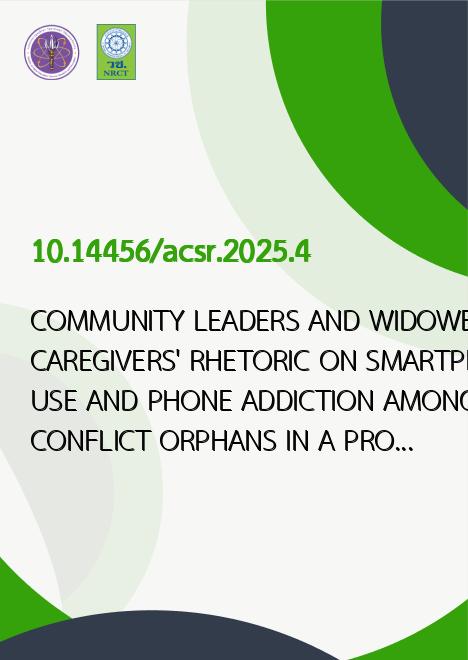
|
COMMUNITY LEADERS AND WIDOWED CAREGIVERS’ RHETORIC ON SMARTPHONE USE AND PHONE ADDICTION AMONG CONFLICT ORPHANS IN A PROLONGED LOW-INTENSITY ARMED CONFLICT AREA |
|---|---|
| รหัสดีโอไอ | |
| Creator | Thaparat RAKPANUSIT |
| Title | COMMUNITY LEADERS AND WIDOWED CAREGIVERS’ RHETORIC ON SMARTPHONE USE AND PHONE ADDICTION AMONG CONFLICT ORPHANS IN A PROLONGED LOW-INTENSITY ARMED CONFLICT AREA |
| Contributor | Mayuening ESO, Sareeda WAHENG, Wit WICHAIDIT |
| Publisher | Asian Crime and Society Review |
| Publication Year | 2568 |
| Journal Title | Asian Crime and Society Review |
| Journal Vol. | 12 |
| Journal No. | 1 |
| Page no. | Article 4 |
| Keyword | Smartphone Addiction, Children, Youths, Conflict, Orphans |
| URL Website | https://so02.tci-thaijo.org/index.php/IJCLSI |
| Website title | https://so02.tci-thaijo.org/index.php/IJCLSI/article/view/274533 |
| ISSN | 3027-6896 |
| Abstract | Smartphone addiction is an emerging problem among children and youths worldwide, and caregivers have a unique role in controlling children and youth’s access to phones. However, data are scarce about caregivers’ rhetoric of smartphone use by vulnerable and traumatized children and youths, such as in Thailand's Deep South region, where a local insurgency has resulted in thousands of conflict widows and orphans. The objective of this study was to describe the rhetoric of community leaders and widowed caregivers about smartphone use and phone addiction behaviors among adolescents in a conflict-affected area. Using a semi-structured questionnaire, we collected qualitative data in Khok-Yang Village, Phron Sub-District, Tak Bai District, Narathiwas Province, Thailand. Data collectors conducted in-depth interviews and focus group discussions with five community leaders and five parents as part of a baseline study for participatory action research. We then analyzed data using content analysis. Participants deemed that smartphone use replaced outdoor and physical activities among children and youths. Still, they could also be a less harmful activity than socialization with potential illegal acts. Our study was one of the first to describe the rhetoric on smartphone use and addiction in conflict-affected populations. However, limitations regarding the lack of probing and potentially unsaturated data should be considered when interpreting the study findings. |
